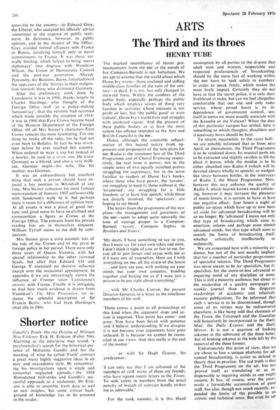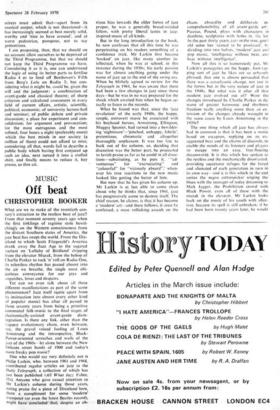ARTS The Third and its throes
HENRY TUBE
The marked resemblance of recent pro- nouncements from the BBC to the novels of Ivy Compton-Burnett is not fortuitous. We are apt to assume that the world about which Dame Ivy wrote—those enclosed and stifling middle-class families of the turn of the cen- tury—is dead. It is not, has only changed its outward form. Within the confines of the public body, especially perhaps the public body which employs scions of thoss, very families in activities whose measure is not profit or loss. but 'the public good' or even 'culture', Dame Ivy's world lives and struggles with unabated vigour. And the greatest of these public bodies, or at least the most salient (no offence intended to the Arts and British Councils) is the Bac.
Hence, although the ostensible subject- matter of this heated outcry from op- ponents and proponents of the new plans for BBC Radio is the imminent loss of the Third Programme and of Choral Evensong respec- tively, the real issue is power; not in the simple sense of two equally matched parties struggling for supremacy, but in the sense familiar to readers of Dame Ivy's books, where those who have power, the 'tyrants', are struggling to keep it; those without it, the 'tyrannised', are struggling for a little freedom, or at least free speech; while those not directly involved, the 'spectators', are hoping to see blood.
The letters from the proponents of the new plans—the management and governors of the BBC—seem to adopt quite naturally the tone of outrage proper to a Compton- Burnett 'tyrant'. Compare Sophia in Brothers and Sisters:
'My dears, I have something to say to you, that I must say for your own sakes and mine. I don't think it right of you, or fair to me, for you all to join forces and argue with me as if I were one of yourselves. Here am I with everything on me, all the strain of the house . . . and here are you, with nothing on your minds but your own concerns, banding together and baiting me as if I were just a person to be put right about everything!'
. . . with Mr Charles Curran, the present Director-General. in a letter to the rebellious members of his staff : 'There comes a point in all proceedings of this kind when the argument stops and ac- tion is required. That point has come—and gone. You have been heard with patience and, .I believe, understanding. If we disagree it is not because your arguments have gone unheard. It is because we cannot be recon- ciled in our views. And that really is the end of the matter.'
Or with Sir Hugh Greene, his predecessor: 'I can only say that I am ashamed of the members of staff, many of them my friends, who have signed recent letters to the Times. To seek safety in numbers from the usual penalty of breach of contract hardly strikes me as admirable.'
For the rank outsider, it is this bland
• • •
assumption by all parties to the dispute that adult men and women, respectable and respected professionals of broadcasting,
should by the mere fact of working within the BBC have to 'seek safety in numbers'
in order to speak freely, which makes the most lively impact. Certainly they do not have to fear the secret police, it is only their
livelihood at stake, but can we feel altogether comfortable that our one and only radio service, whose proud boast is its in- dependence of government control, sees itself in terms we more usually associate with the Kremlin or the Vatican? When the dust of this particular rumpus has settled, here is something to which thoughts, shoulders and if necessary bows should be bent.
To return, meanwhile, to the casus belli: we are reliably informed that as from next April, or thereabouts, the Third Programme is to be rendered down. Its musical parts are to be extracted and slightly swollen to fill the place it leaves, while the residue is to be either absorbed into Radio 4 (which will be devoted almost wholly to speech), or wedged, like straw between bottles, in the interstices of Radio 3, the Music Programme. Now, however this may enhance the quality of Radio 4, which heaven knows needs enhanc- ing, however it may increase the pleasures of music-lovers, it is certain to have at least one negative effect : four hours a night of public air-space which have up to now been set aside for advanced broadcasting will be so no longer. By 'advanced' I mean not only that type of broadcasting which aims to entertain, inform and perhaps even stretch advanced minds, but that type which aims to stretch the limits of broadcasting itself. whether artistically, intellectually or technically.
We are concerned here with a minority au- dience, but not of the sort usually implied. that for a number of particular programmes of specialist interest. The Third Programme was never meant to be for specialists, but by specialists for the more-or-less advanced or inquiring mind of any discipline or none. This is still a minority audience, but closer to the readership of a quality newspaper or weekly journal than to the disparate readerships of academic and relatively esoteric publications. To be informed that such a service is to be discontinued, though some of its virtues may be rediscovered elsewhere, is like being told that elements of the Times, the Telegraph and the Guardian will henceforth be incorporated in the Daily Mail, the Daily Express and the Daily Mirror. It is not a question of looking askance at the substance of the three latter, but of looking askance at the hole left by the
removal of the three former. '
Unfortunately this point of view, that we are about to lose a unique platform for ad- vanced broadcasting, is easier to defend in theory than in practice. The sad truth is that the- Third Programme on the air, has not proved itself as stimulating or as In- dispensable to inquiring minds as one might assume. It has, of course, over the years. made a formidable accumulation of good stuff, has also, though not much recently, ex- panded the limits of the possible in an artistic and technical sense. But even Its ad-
mirers must admit that—apart from its musical output, which is not threatened—it has increasingly seemed at best merely solid, worthy and 'nice to have around', and at worst pedestrian, pompous, not to say pretentious.
I am proposing, then, that we should on no account allow ourselves to be deprived of the Third Programme, but that we should not keep the Third Programme we have. Considering it as it is, one can understand the logic of using its better parts to fertilise Radio 4 or to fend off Beethoven's Fifth from Berg's Lulu on Radio 3; but con- sidering what it might be, could be, given the will and the judgment: a combination of avant-garde and classical theatre; of sharp criticism and calculated assessment in every field of current affairs, artistic, scientific, political, economic; of university lecture-hall and seminar; of public debate and private discussion; a place for experiment and con- solidation; for argument and provocation; for- the most outrageous and the most refined; four hours a night (preferably more) which the best minds in our society (a million of them) could not afford to miss; considering all that, words fail to describe a public body which having first conjured up such an idea, next turned it into a stuffed shirt, and finally means to reduce it, hey presto, to thin air.



































 Previous page
Previous page